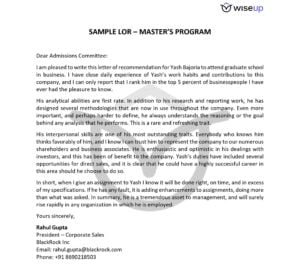Are you a study abroad applicant? If so, you know that a Letter of Recommendation (LOR) is a vital component of your university application. In this blog, we’ll explore what an LOR is and how to write one effectively. You’ll learn how to highlight your strengths, provide relevant examples, and tailor your message to fit different academic levels and application requirements. We’ll also discuss whom to approach for these letters. With these insights, you’ll be ready to make your study abroad application truly stand out!
What’s a Letter of Recommendation (LOR)?
So a Letter of Recommendation, also called an LOR forms an important document in the admission process for studying abroad.
Now ideally it should be written by your professor or employer, but most of the time you will see yourself writing it on their behalf. Each university will require you to submit 2-3 LORs.
How To Write an LOR?
A Letter of Recommendation (LOR) generally consists of 5 sections:
- Greeting
- Introduction
- Body
- Conclusion
- Signature.
Section 1 – Greeting
When composing a letter, addressing the recipient appropriately in the greeting section is crucial.
Keep it formal:
Typically, this can be done by writing “Dear Admissions Committee” or “Dear Admissions Officer.” Alternatively, you can use “To Whom It May Concern” if you are unsure of the specific recipient.
Don’t make it informal:
Avoid using informal greetings like “Hi” or “Hello.” Additionally, refrain from using the term “Respected,” as this is not commonly used in international contexts. Instead, stick with the more universally accepted “Dear” to ensure a professional and polished greeting.
Section 2 – Introduction
This is the opening paragraph of the letter of recommedation. Let us understand what needs to get covered here.
Explain the relationship between the recommender and the candidate:
In your letter, it is important to explain your relationship with the candidate, how long you have known them, and any specific subjects you have taught or projects you have supervised.
Introduction of the Recommender
Give a brief introduction of the recommender and share with the committee how long and in what capacity has the recommender known you. For example, which subject have they taught you, or which project they have supervised.
E.g. if they are a professor, then the letter could open like this: I, Dr. S Krishna, Assistant Professor at IIT Mumbai, am delighted to be writing this letter to recommend Ms. Arjun Khatri for your graduate program.
Capacity and duration of interaction
After that how has the professor known me and in what capacity will come.
E.g. I have known Neha since her first year of undergraduate studies and have taught her the subjects XYZ.
Now if youre writing 2-3 LORs, make sure you vary this a bit. The content will more or less be the same, but try to write it in a different style and rearrange the info a bit so that it seems other authors have written it.
Once these components have been incorporated, your opening paragraph will be complete.
Section 3 – Body
The body of the letter is crucial for outlining the candidate’s professional and personal qualifications. It should be drafted concisely and coherently, focusing on both their technical skills and soft skills.
Professional Skills
- Discuss the candidate’s proficiency in relevant subjects.
- Highlight their problem-solving abilities in projects.
- Mention their experience in lab work or research.
- Provide specific examples to support your claims.
Example: “Throughout my course, Arjun demonstrated exceptional proficiency in Data Structures, consistently achieving top marks and contributing innovative solutions during group projects.”
Soft Skills:
- Communication Abilities: Describe how the candidate effectively communicates during presentations.
- Teamwork Skills: Highlight instances where they demonstrated strong collaboration during projects.
- Unique Qualities: Include characteristics that set the candidate apart from peers.
Example: “Arjun’s communication skills were particularly evident during her final project presentation, where she engaged the audience with clarity and confidence. Her ability to collaborate effectively with team members was instrumental in the project’s success.”
Differentiating Letters of Recommendation
To ensure each letter of recommendation highlights different aspects of the candidate, choose major theme for each type of LOR. Some guidelines are mentioned below on how you could do that.
- First LOR: Focus on academic strengths, class participation, and lab performance.
- Second LOR: Emphasize research skills demonstrated in a specific project.
- Third LOR: Concentrate on corporate skills and responsibilities during an internship or job.
To learn about writing this section in detail you can check out our video below:
Section 4 – Conclusion
Finally, it’s the conclusion section. Here, summarize the candidate’s key strengths.
It is also possible to comment on how well the candidate will fit into the university and program they are applying to if you know of it.
Lastly, it is crucial to state clearly that you are recommending the candidate.
For instance, you can say, “Aditya would be a tremendous asset to your program and I recommend him to you without reservation”.
In this way, you can end your letter of recommendation on a positive note.
Section 5 – Signature
Lastly, include all the recommender’s details in the signature section, so the admissions committee can contact them if needed.
In this section, you should include the recommender’s name, their job title, the name of their company or university, and their contact information such as email and phone number.
Expert tip!
Try and take your recommendation letters from professors or supervisors who know you well and have observed you closely, either for a project or an assignment. They will be able to comment better on your academic ability and personality rather than a head of department who just knows you by name.
BONUS LOR SAMPLE
Here is a bonus LOR sample for you. This is a professional LOR written by a corporate manager of a company. You can see how the different sections discussed in this blog have been incorporated here. Using this LOR, the student got admits from top universities in USA and other countries as well!

Now if wish to receive more such samples which got students admits from top universities and learn how to write an LOR properly, you can register for our study abroad workshop – Study Abroad Course
And if you wish to get your LORs reviewed by our expert team, then do register for our LOR Review program! – LOR Review Program.
To get an in depth overview on the above bonus sample you can check out the video below:
We wish you all the very best for your career ahead! If you have any queries, feel free to comment below and we will try to get back to you at the earliest!




